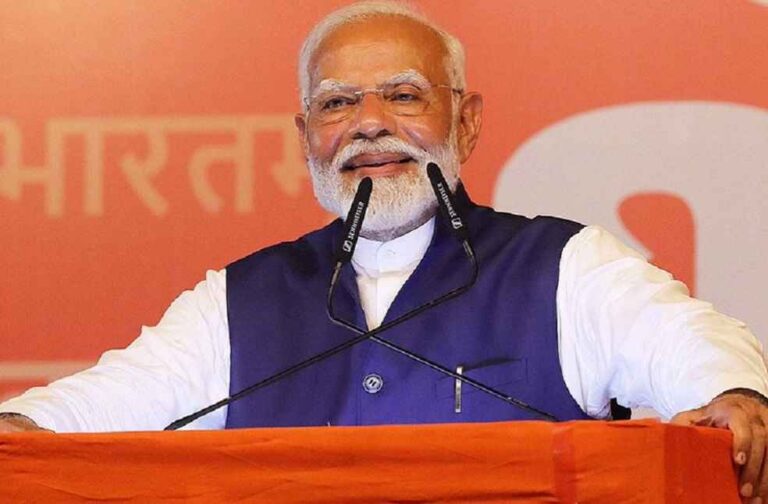New Delhi: In the world’s largest democracy, India, a new government began yesterday with the swearing-in of 72 newly elected members. This is the third consecutive time that Narendra Modi has become the Prime Minister of India.
In the past two terms, Modi’s party, the Bharatiya Janata Party (BJP), came to power by securing significantly more than the required 272 seats (2014/282 seats, 2019/303 seats) to govern India.
This dominance allowed Narendra Modi’s administration to proceed without considering other political parties within the BJP-led coalition, the National Democratic Alliance (NDA). However, this approach has negatively impacted India’s standings on various global indices, such as human rights, religious freedom, media freedom, the Democracy Index, the Happiness Index, the civil liberty index, and the equality index.
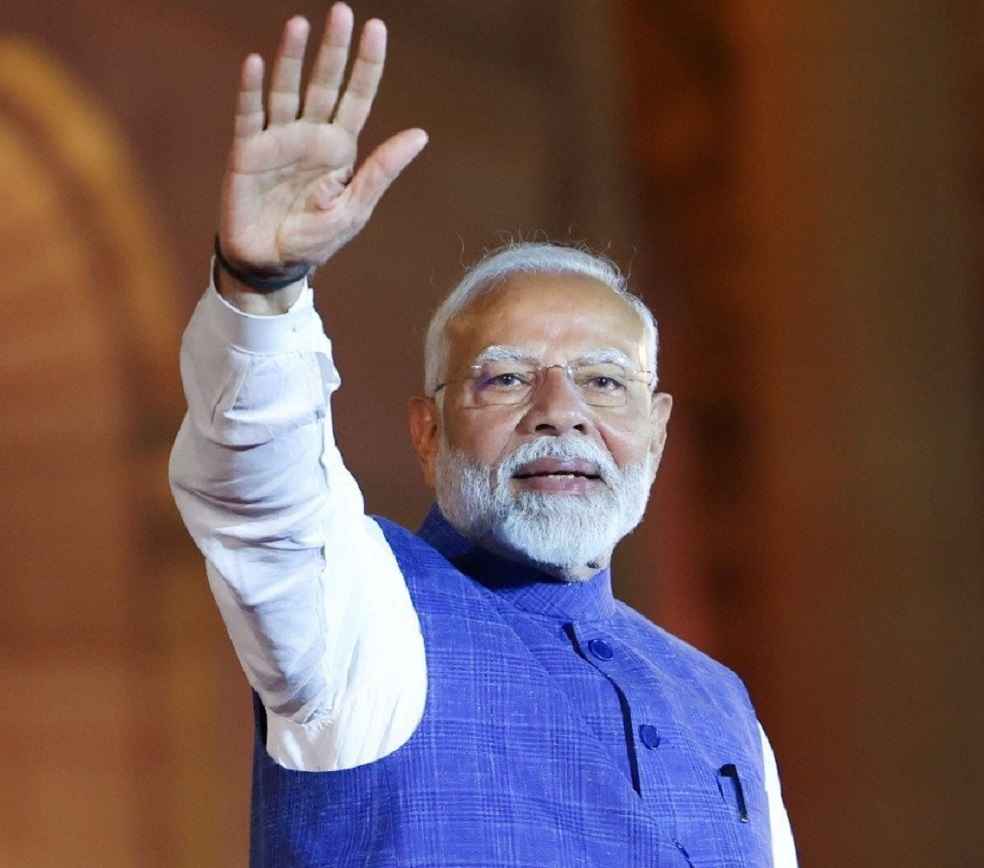
In the 2024 elections, BJP’s seat count dropped to 240. Consequently, they had to rely on the support of 53 seats from other political parties within the NDA, totalling 293 seats to form the government. This development is seen as strengthening the concept of the ‘Union Ministry’ in a democracy.
Meanwhile, a significantly stronger opposition compared to the previous two terms is expected to benefit the democracy of this diverse nation. The crucial electoral process began with general elections held in India from April 19 to June 1, 2024, in seven phases to elect all 543 members of the Lok Sabha. Votes were counted, and the results were declared on June 4.
Out of a population of 1.4 billion, more than 968 million people were eligible to vote, which is 70 per cent of the total population. A record 642 million voters participated in the election, including 312 million women, marking the highest-ever participation by women voters.
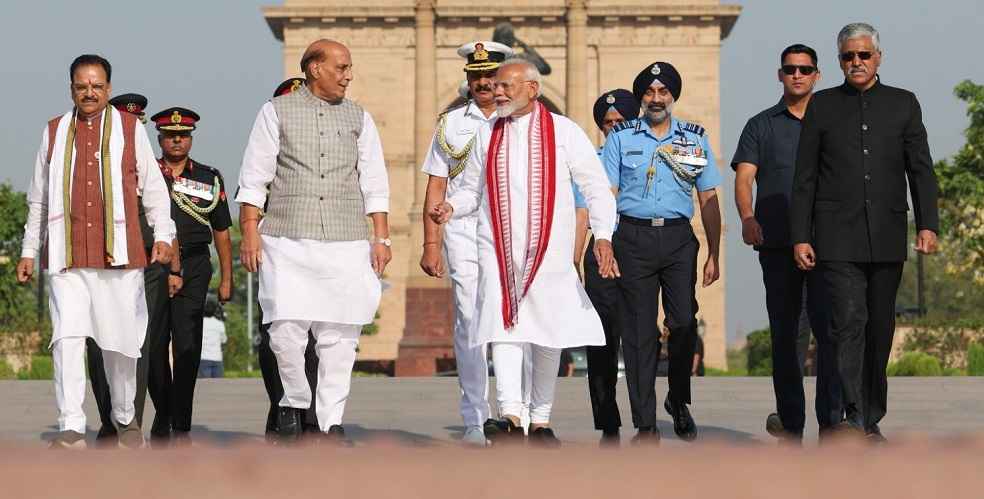
Brilliant and Foresight Strategy?
According to conspiracy theorists, the new coalition government that came to power without a BJP majority is part of a long-term strategy controlled by the BJP’s parent organization, the RSS. Following a pre-arranged plan, the RSS aims to secure 350 seats on its own and bring a coalition government with over 400 seats to power before the RSS’s 100th anniversary celebrations. Some independent international election observers also believe that this theory cannot be completely dismissed.
About RSS
The Rashtriya Swayamsevak Sangh (RSS) was founded on 27 September 1925. The organization aims to propagate the ideology of Hindutva, which it believes will strengthen the Hindu community. It also promotes what it considers to be Indian culture and civilisational values. The RSS will complete the centenary of its founding on 27 September 2025.
This is a Hindu nationalist organization in India with a vast network and influence. It claims to be the world’s largest non-governmental organization (NGO) due to its large number of daily gatherings (shakhas) across India. However, due to the extreme secrecy maintained by the RSS, it is impossible to track individual membership numbers, making it difficult to determine the exact size of the organization.
RSS’s Unwritten Goals
Conspiracy theorists claim that this secretive-based organization has numerous unwritten goals. The most important of these is to have Hindutva forces govern India by the time of the organization’s 100th anniversary and to declare India a Hindu nation in its 101st year.
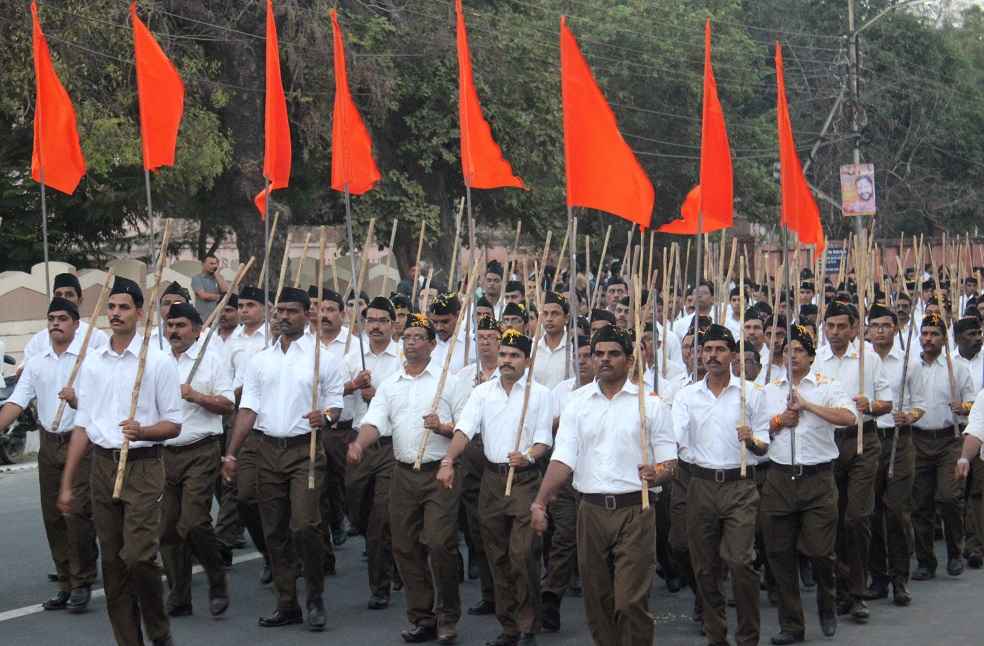
RSS – BJP Relations
The Rashtriya Swayamsevak Sangh (RSS) and the Bharatiya Janata Party (BJP) have a close and significant relationship, rooted in their shared ideology and historical connections.
- Ideological Alignment: Both are driven by Hindutva, emphasising Hindu cultural values.
- Historical Roots: The BJP emerged from the Bharatiya Jana Sangh, the RSS’s political arm.
- Organisational Support: The RSS provides grassroots support, especially during elections.
- Leadership Overlap: Many BJP leaders, including PM Narendra Modi, have RSS backgrounds.
- Policy Influence: The RSS influences BJP policies, especially on cultural and social issues.
- Autonomy and Coordination: They maintain distinct structures but coordinate on strategic matters.
- Controversies: Critics argue the RSS’s influence promotes a majoritarian agenda.
In summary, the RSS and BJP’s symbiotic relationship shapes India’s political landscape and promotes the Hindutva agenda.
Conspiracy Theorists’ Backup
Voting Machines: Since the 2004 Lok Sabha election, India has been using Electronic Voting Machines (EVMs) exclusively. Initially tested in some booths in 1982, EVMs survived 22 years of significant controversies before being fully implemented in 2004. Today, India is one of the few democracies that use Electronic Voting Machines entirely. Due to studies, observations, and concerns suggesting that EVMs could be tampered with by those in power or hackers, many countries do not trust or adopt this system.

-
- Major developed countries, including England, France, Germany, the Netherlands, and the United States, have either banned or significantly restricted the use of EVMs due to concerns about security, transparency, and voter confidence in the electoral process.
- In the 2014 Lok Sabha elections, and more extensively in the 2019 elections, over 20 per cent of ordinary voters and a section of the opposition political leadership believe that Electronic Voting Machines (EVMs) were tampered with, especially in regions under complete BJP control. Numerous incidents in India have supported and justified this belief.
- Following the BJP’s unexpected victory in 2019, several cases were brought to Indian courts demanding the ban of EVMs and the maintenance of election security, transparency, and voter confidence. However, these cases have either been dismissed, decided ambiguously, or unjustifiably delayed.
Election Commission of India: The Election Commission of India handles the enormous responsibility of upholding the integrity of India’s diversity, which includes over 1.4 billion people, more than six religions, 3,000 castes, and over 120 languages. Its duties encompass evaluating and regulating political party campaigns, conducting transparent elections, coordinating electoral systems, and enforcing penalties for rule violations, all without compromising the country’s pluralism.
-
- But, the Election Commission has faced numerous allegations and widespread doubts about bias ahead of the 2024 election results. Members of the Election Commission resigned without providing explanations, the Chief Justice was excluded from the committee responsible for appointing Election Commissioners, and the framework was altered to allow the ruling party to appoint its preferred candidates as Commission members. Additionally, there has been a lack of strong action against religious polarisation and unification speeches made by BJP leaders, including Prime Minister Narendra Modi.
Judiciary and Administrative
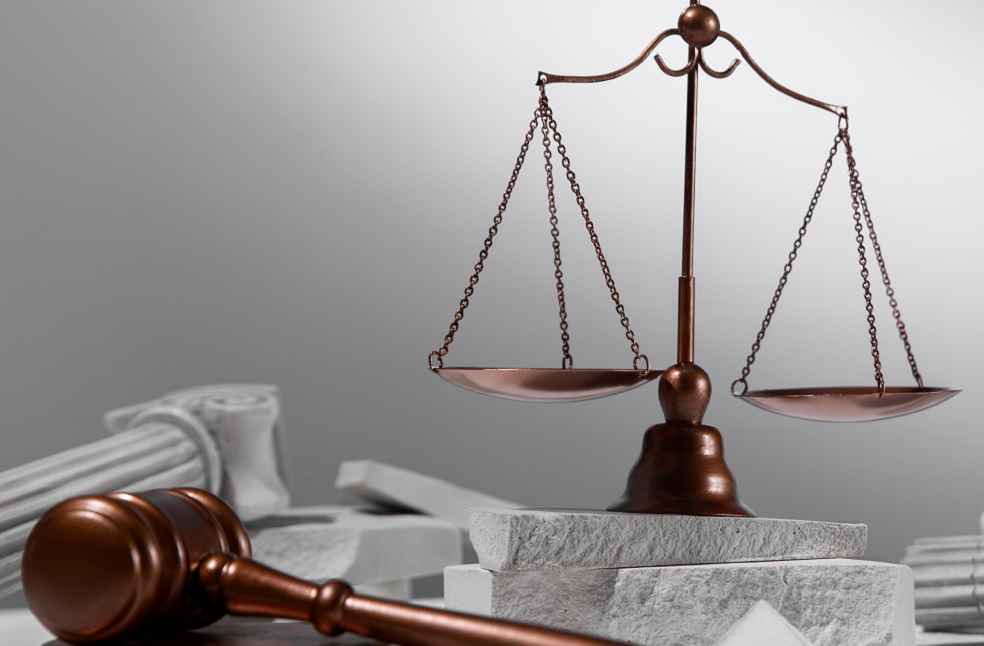
There is a widespread belief that the majority of the Judiciary and Administrative System in India favours the BJP and RSS on crucial matters. This belief has arisen from numerous events and observations over the past decade.
Judicial Appointments and Transfers
- Collegium System: Critics argue that the collegium system of appointing judges lacks transparency and accountability, which could allow political influence in the appointment process.
- Controversial Appointments: There have been several instances where judicial appointments and transfers have raised eyebrows. Notable examples include the transfer of Justice Akil Kureshi, who had issued unfavourable judgments against BJP leaders, and the nomination of former Chief Justice Ranjan Gogoi to the Rajya Sabha by the BJP.
High-Profile Cases
- Verdicts Favourable to BJP: Some high-profile cases have had outcomes favourable to the BJP. For instance, the verdict in the Ayodhya dispute, perceived as favouring the BJP, the clean chit to Narendra Modi in the 2002 Gujarat riots case, and the relatively lenient treatment of BJP leaders in various corruption cases have added to this belief.
- Delays and Fast-Tracking: Certain cases involving opposition leaders seem to experience delays, while others involving BJP leaders are expedited, leading to accusations of bias.
Administrative Actions
- Use of Investigative Agencies: There have been allegations that central investigative agencies like the Central Bureau of Investigation (CBI), Enforcement Directorate (ED), and Income Tax Department are being used to target political opponents of the BJP, while BJP leaders receive more favourable treatment.
- Bureaucratic Appointments: The appointment of bureaucrats perceived to be close to the BJP or RSS to key positions in the administration has also contributed to this perception.
Statements and Actions of RSS-Linked Individuals
- Public Statements: Leaders and influential figures linked to the RSS have sometimes made public statements that suggest a close alignment between the judiciary, the administrative system, and the BJP-RSS ideology.
- Policy Influence: The influence of RSS ideologues on policy-making and administrative decisions has been noted, with some bureaucrats and judicial officers being seen as implementing the ideological agenda of the RSS.
Corporate Media and Social Media

There have been widespread complaints for about ten years that the majority of corporate media and social media platforms operate in favour of the BJP and RSS. Additionally, there are common complaints that corporate lobbies fund the BJP.
Ownership and Control
- Media Ownership: Many large media houses are owned by corporations with close ties to the BJP. These owners may influence editorial policies to favour the party.
- Consolidation: The consolidation of media ownership in the hands of a few pro-BJP business magnates can skew reporting and coverage.
Financial Influence
- Advertising Revenue: BJP’s extensive use of advertising budgets can make media outlets financially dependent, leading to favourable coverage to secure continued advertising revenue.
- Corporate Funding: Allegations suggest that corporate lobbies fund the BJP in return for favourable policies, which can lead to biased media coverage supporting BJP interests.
Social Media Dynamics
- Algorithm Manipulation: Social media platforms use algorithms that can be manipulated to favour content from certain political entities. The BJP’s effective use of IT cells and bots can amplify pro-BJP content.
- Content Moderation: There are accusations that social media platforms are lenient towards pro-BJP content while censoring or reducing the visibility of opposition content.
Political Pressure and Intimidation
- Government Influence: There are instances where media outlets face pressure from the government to tow the line, with threats of legal action or withdrawal of government advertising.
- Intimidation Tactics: Journalists and media houses critical of the BJP often face harassment, raids, and legal challenges, discouraging negative reporting.
Ideological Alignment
- RSS Influence: The RSS’s extensive network and ideological alignment with certain media owners and influencers lead to favourable coverage for the BJP.
- Cultural Resonance: The BJP’s nationalist rhetoric resonates with a section of the media that shares similar cultural and ideological values.
Claims of the Conspiracy Theorists

Conspiracy theorists present 10 key issues, including those mentioned above, which they consider crucial as backup for their arguments. They claim that the RSS evaluated that the BJP would win 200 to 250 seats without any electoral malpractices. For the remaining seats needed for a majority, plans were allegedly made to purchase the necessary support in advance, and agreements were reached with some opposition parties during the second phase of the elections.
They argue that the current interim coalition government is a strategy to clear the global suspicions surrounding the BJP and RSS. The interim plan aims to cleanse all entities under suspicion, including voting machines, the Election Commission, the judiciary, administrative systems, corporate media, and social media. They also claim that the reduced vote share in Prime Minister Modi’s victory and events like the Ayodhya defeat were part of the RSS’s strategy.
In summary, it is predicted that Modi’s third NDA coalition government will fall by the second quarter of 2025. Despite attempts by the current opposition to form a new government, conspiracy theorists claim that plans are already in place to thwart these efforts. They allege that a deal has been made to buy off around 50 opposition MPs.
In the midst of this ongoing crisis, a new election will be called. The BJP is expected to emerge as the largest single party, winning over 320 seats. Their alliance partners are projected to secure between 80 and 100 seats, bringing the NDA coalition’s total to over 400 seats.
Yes, the RSS aims for a coalition government with an overwhelming majority of over 400 seats, effectively silencing the opposition. Conspiracy theorists argue that the current Indian government is merely an interim arrangement to smoothly transition to such a government before the RSS’s 100th anniversary on September 27, 2025.
HEALTH READ | Does oily fish lower heart disease risk?


